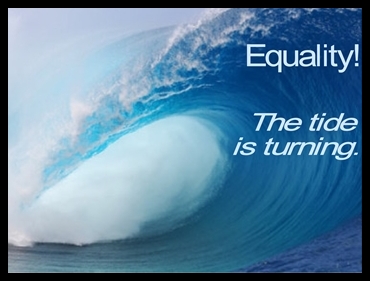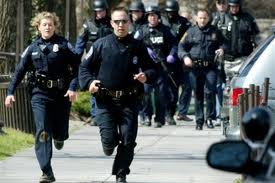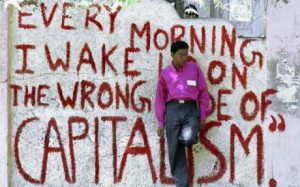watershed: 2: a crucial dividing point, line, or factor: turning point
Last week I framed Election Day in terms of a makeover: Before—the run-up to November 6, characterized by dread and fear of a Romney win and the ensuing turning back the tide on pieces of progress too numerous to name that were enacted during Obama’s first term; and after—the immense relief and joy, when not only was the president decisively re-elected but the a huge number of contested offices and initiatives were chalked up in the win column for progressives.
In terms of LGBT equality and marriage equality, history will look back on November 6, 2012, as a watershed. Here’s what happened:
Mainers voted yes on Question 1, and secured the right to marry for all Maine couples, by a margin of nearly six points.
Maryland Governor Martin O’Malley signed equality into law in March, and Question 6 gave the voters of the state a chance to endorse it on the 6th, which they did, definitively.
In Minnesota, the voters said no to a constitutional amendment defining marriage as between one man and one woman. Minnesota still does not have legal marriage equality, but can that next step be far behind, after the decisive victory on November 6?
In the Pacific Northwest, in Washington, where last February Governor Chris Gregoire signed marriage equality into law after it passed both houses of the legislature, opponents of equality gathered enough signatures to force a public vote on it, with Referendum 74. The voters said no to the naysayers, and yes to equality.
Between the years of 1973 and 2012, a sea change has occurred with regard to marriage equality and the law. Maryland became the first state to statutorily ban same-sex marriage, back in 1973, and, 39 years later, the first state (along with Maine) to legalize it at the ballot box, in 2012.
Massachusetts set the standard in 2003, when its supreme court ruled in Goodridge v Dept. of Public Health that same-sex couples had the right to marry. Connecticut followed suit in 2008. 2009 was a big year, when Vermont, Iowa, New Hampshire, and the District of Columbia joined in for equality. New York chimed in in 2011, and then Washington, Maryland, and Maine in 2012. Now nine states plus DC have marriage equality, and other states are lining up to say Yes to equal rights.
Along the way, there have been fits and starts, hope and heartbreak. Two of many examples: (1) California legalized marriage equality in 2008, only to pass the massive Proposition 8, by which the voters rejected it. That battle continues to this day, with some kind of definitive action expected from the Supreme Court of the United States by the end of the month, when they’ll decide either to re-hear the Ninth Circuit decision, which rejected Prop 8, or not (if not, the assumption is that same-sex marriages will be able to resume in California, finally). (2) New Jersey’s legislature also passed marriage equality in 2012, only to see their efforts squashed by Governor Chris Christie’s promised veto, for which he is sure to go down on the wrong side of history.
And we must remember the cloud that hangs over all these states’ victories, the Defense of Marriage Act (DOMA), signed into law by President Clinton in 1996, which legally defined marriage as between one man and one woman for federal and interstate purposes. In a small but sure step toward progress, the Obama administration decided in 2011 to abandon defending this misguided discriminatory law in the courts. With the encouraging election behind us, there is new reason to hope that DOMA will end up in the dustbin before the end of Obama’s tenure.
November 6 marked the point of no return for business as usual, regarding marriage and the law in our country. The first sitting president to endorse marriage equality won re-election in no uncertain terms, the four states with the issue on the ballot passed it easily. And there were other firsts in this watershed election: Tammy Baldwin (Wisconsin) became the first openly LGBT candidate to win a seat in the U.S. Senate, the largest ever number of openly LGBT people were elected to Congress, two new speakers claimed state houses, the first-ever openly transgender person was elected to a state legislature, and numerous openly LGBT candidates were elected at the state level.
In 2008, candidate Obama’s views on equality were still evolving, and he refused to commit to a pro-equality stance. The jubilation experienced across the country with his election was tempered by the passage of the discriminatory Prop 8 in California, which overturned the California Supreme Court’s finding for marriage equality. Now, four short years later, President Obama’s explicit endorsement of same-sex couples’ freedom to marry, backed by the tireless efforts of LGBT advocates nationwide, fueled historic gains for marriage equality. Public opinion has followed this progressive path, as well, so that now approval of same-sex marriage in the United States is at an all-time high.
There is still a great deal of work for advocates to do, and there will be no resting on the laurels from November 6 victories. Adam Umhoefer, executive director of the American Foundation for Equal Rights (AFER), put it this way: “While we celebrate these momentous achievements for equality, we know that our work is not yet done. Millions of gay and lesbian Americans continue to suffer under the injustice of discrimination every day just by living in states that do not recognize marriage equality.” That work is already in full swing, as several more states are initiating or continuing plans to get marriage equality onto their books. The next few years could bring more progress than ever.
Martin Luther King Jr, the fearless warrior for the Civil Rights movement of the 1960s, who gave his life for the cause, said, “The arc of the moral universe is long, but it bends toward justice.” November 6, 2012, will always be regarded as a major tipping point in the march toward justice for our country, a watershed. The rising tide for equality can never be turned back now.
_______________________________________________________________________________________________________

Learn more about Rachel’s new novel here —-> Driving in the Rain
Join Rachel on Facebook here —-> The Equality Mantra
A Watershed for Equality,




